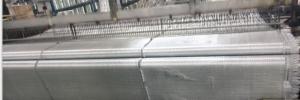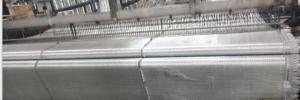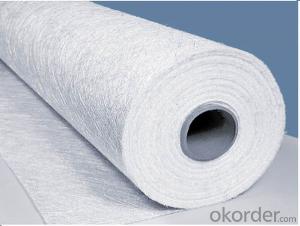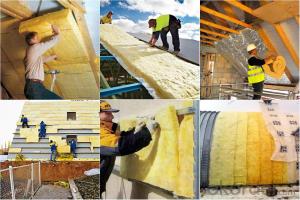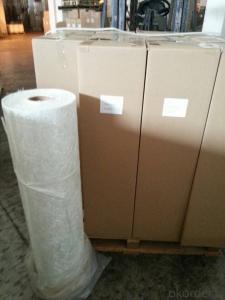E-glass Fiberglass Woven Roving,800g,1270mm
- Loading Port:
- Shanghai
- Payment Terms:
- TT or LC
- Min Order Qty:
- 5000 kg
- Supply Capability:
- 300000 kg/month
OKorder Service Pledge
OKorder Financial Service
You Might Also Like
Structure of woven roving Description
1,high strenth,corosion and resistence
2,consistent thickness,no fuzz
3,rapid impregnating
Glass woven rovings are bidirectional fabric by direct rovings in plain weave pattern. They are applicable for hand lay-up, winding and compress molding process, suitable for manufacturing tank, boat, automobile parts and other FRP products.
Main Features of the woven roving
1)Drapes well to suit the surface of intricate moulds
2)Fast wet-through and wet out
3)Easy handing and better appearance of the composite parts
4)Compatible with Unsaturated polyester resin
5)Very high laminate strength properties
Woven roving Images
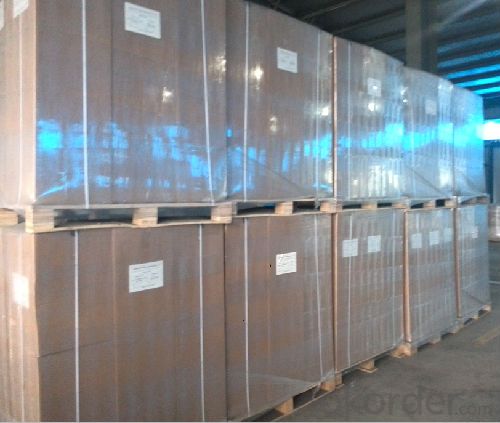
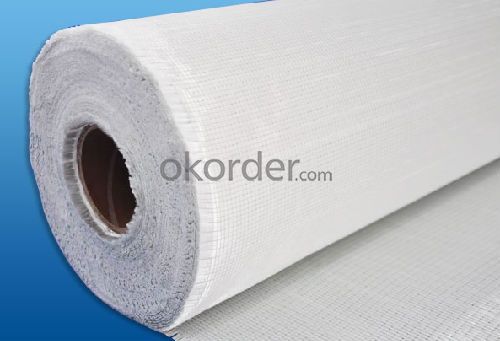
Woven roving Specification: weight& thickness
Normal type | EWR800-1000 | Test Standard |
Apperance | Good | GB/T 18370-2001 |
Density(warpxweft)(end/cm) | 1.8 X 1.5 | GB/T 7689.2-2001 |
Tex (warpxweft) | 2400x2400 | ISO1889 |
Moisture content(%) | ≤0.10 | ISO3344 |
Loss on ignition(%) | 0.40-0.80 | ISO1887 |
Glass | E-glass | N/A |
FAQ of woven roving:
Delivery Detail: 15-21days
Other spec. can be custom made as per customer's request.
- Q:Is fiberglass mat tissue resistant to UV degradation?
- Fiberglass mat tissue is generally resistant to UV degradation to some extent. However, its level of resistance may vary depending on the specific type and quality of the fiberglass mat tissue. UV degradation occurs when prolonged exposure to ultraviolet (UV) radiation from the sun causes the degradation of materials. This degradation can lead to discoloration, brittleness, and reduced strength in the material. Fiberglass mat tissue is often manufactured with additives and coatings that provide some level of UV resistance. These additives and coatings help to protect the fibers from the damaging effects of UV radiation. However, it is important to note that the level of UV resistance can vary between different manufacturers and products. To ensure maximum UV resistance, it is recommended to choose fiberglass mat tissue that is specifically designed for outdoor applications and has been tested for UV stability. Additionally, proper maintenance and periodic inspections can help to identify any signs of UV degradation and allow for timely repairs or replacements if necessary.
- Q:Can fiberglass mat tissue be used for insulation in cold environments?
- Indeed, fiberglass mat tissue is a viable option for insulation purposes in frigid settings. Fiberglass, renowned for its remarkable thermal characteristics, is frequently employed as an insulating material. Its capacity to hinder heat transfer is owed to its low thermal conductivity, effectively ensuring insulation in cold environments. Tailored specifically for thermal insulation, fiberglass mat tissue is commonly utilized in various applications such as walls, roofs, and floors to thwart heat dissipation and maintain a cozy indoor temperature. Moreover, fiberglass boasts resistance to moisture and exhibits durability, rendering it impervious to degradation and loss of insulating properties in cold and damp conditions. Consequently, fiberglass emerges as an apt choice for insulation in cold environments.
- Q:Does fiberglass mat tissue require any special precautions during disposal?
- Yes, fiberglass mat tissue does require special precautions during disposal. Due to its composition, fiberglass mat tissue can release fine particles and fibers into the air when handled or broken. These particles and fibers can be harmful if inhaled or come into contact with skin and eyes. Therefore, it is important to take certain precautions when disposing of fiberglass mat tissue. Firstly, it is recommended to wear appropriate personal protective equipment (PPE) such as gloves, goggles, and a respirator mask to minimize the risk of exposure. This will help prevent the inhalation of airborne particles and fibers and protect the skin and eyes from any potential irritation. Secondly, fiberglass mat tissue should be disposed of in sealed bags or containers to prevent any loose fibers from becoming airborne during transportation. It is also advisable to label the bags or containers as "hazardous" or "fiberglass waste" to alert others of the potential risks. Furthermore, it is important to follow local regulations and guidelines for the disposal of fiberglass mat tissue. Depending on the location, there may be specific requirements for handling and disposing of hazardous waste materials, including fiberglass. These regulations are in place to protect public health and the environment. In summary, fiberglass mat tissue does require special precautions during disposal to minimize the risk of exposure to harmful particles and fibers. Wearing appropriate protective equipment, using sealed containers, and following local regulations are essential steps to ensure safe disposal practices.
- Q:Can fiberglass mat tissue be used for insulation?
- Yes, fiberglass mat tissue can be used for insulation. It is commonly used in the construction industry as a thermal and sound insulation material. The fiberglass mat tissue is made up of fine fibers of glass that are woven into a mat-like structure. This structure traps air and creates a barrier that helps to reduce heat transfer, keeping the desired area insulated and maintaining a comfortable temperature. Additionally, fiberglass mat tissue is also resistant to moisture, fire, and pests, making it a suitable choice for insulation in various applications.
- Q:Can fiberglass mat tissue be used in wet environments?
- Indeed, wet environments can indeed accommodate the utilization of fiberglass mat tissue. This specialized material has been ingeniously engineered to possess an inherent resistance to moisture, thereby enabling it to endure prolonged exposure to water. Consequently, this remarkable attribute renders it highly suitable for deployment in various sectors, most notably construction, marine, and automotive industries. These particular domains frequently necessitate the deployment of components or structures that inevitably encounter water, humidity, or moisture. The material's unparalleled resistance to water impeccably guarantees the preservation of its structural robustness and ensures that it remains impervious to degradation or any diminishment in its performance properties even when confronted with damp conditions.
- Q:Does fiberglass mat tissue have any fire-resistant properties?
- Yes, fiberglass mat tissue does have fire-resistant properties. Fiberglass is inherently fire-resistant due to its composition. It is made from a combination of glass fibers and a thermosetting resin, which gives it its fire-resistant properties. When exposed to high temperatures or flames, fiberglass mat tissue does not easily ignite or burn. Instead, it resists the spread of flames and can help to contain a fire. This makes fiberglass mat tissue a suitable material for applications where fire protection is required, such as insulation, fire barriers, and fireproof panels. However, it is important to note that while fiberglass is fire-resistant, it is not completely fireproof and can still melt or burn under extreme conditions.
- Q:How does fiberglass mat tissue perform in terms of mold and mildew resistance?
- Fiberglass mat tissue demonstrates excellent resistance to both mold and mildew. The material is inherently moisture-resistant, which prevents the growth of mold and mildew. Additionally, fiberglass is non-porous and does not provide a suitable environment for these microorganisms to thrive. Furthermore, fiberglass mat tissue is often used in applications where moisture is present, such as in bathroom walls or showers, and it has proven to be highly effective in preventing the growth of mold and mildew. Overall, fiberglass mat tissue performs exceptionally well in terms of mold and mildew resistance, making it a reliable choice for applications where these concerns are prevalent.
- Q:Can fiberglass mat tissue be used for insulating ductwork?
- Yes, fiberglass mat tissue can be used for insulating ductwork.
- Q:What is the thermal conductivity of fiberglass mat tissue?
- The thermal conductivity of fiberglass mat tissue is typically low, ranging from 0.03 to 0.05 W/m·K. This means that fiberglass mat tissue is a good insulator and can effectively resist the transfer of heat. Its low thermal conductivity makes it suitable for applications such as thermal insulation in buildings, industrial equipment, and appliances.
- Q:Is fiberglass mat tissue suitable for insulation in industrial applications?
- Yes, fiberglass mat tissue is suitable for insulation in industrial applications. Fiberglass mat tissue is a lightweight and flexible material that offers excellent thermal insulation properties. It can effectively trap and retain heat, making it ideal for insulating industrial equipment and machinery. Additionally, it has good fire resistance properties, which is crucial in industrial settings where the risk of fire is higher. Fiberglass mat tissue is also resistant to corrosion, moisture, and chemicals, ensuring its durability and longevity in industrial applications. Overall, its thermal insulation capabilities, fire resistance, and resistance to various environmental factors make fiberglass mat tissue a suitable choice for insulation in industrial applications.
1. Manufacturer Overview |
|
|---|---|
| Location | |
| Year Established | |
| Annual Output Value | |
| Main Markets | |
| Company Certifications | |
2. Manufacturer Certificates |
|
|---|---|
| a) Certification Name | |
| Range | |
| Reference | |
| Validity Period | |
3. Manufacturer Capability |
|
|---|---|
| a)Trade Capacity | |
| Nearest Port | |
| Export Percentage | |
| No.of Employees in Trade Department | |
| Language Spoken: | |
| b)Factory Information | |
| Factory Size: | |
| No. of Production Lines | |
| Contract Manufacturing | |
| Product Price Range | |
Send your message to us
E-glass Fiberglass Woven Roving,800g,1270mm
- Loading Port:
- Shanghai
- Payment Terms:
- TT or LC
- Min Order Qty:
- 5000 kg
- Supply Capability:
- 300000 kg/month
OKorder Service Pledge
OKorder Financial Service
Similar products
New products
Hot products
Hot Searches
Related keywords
